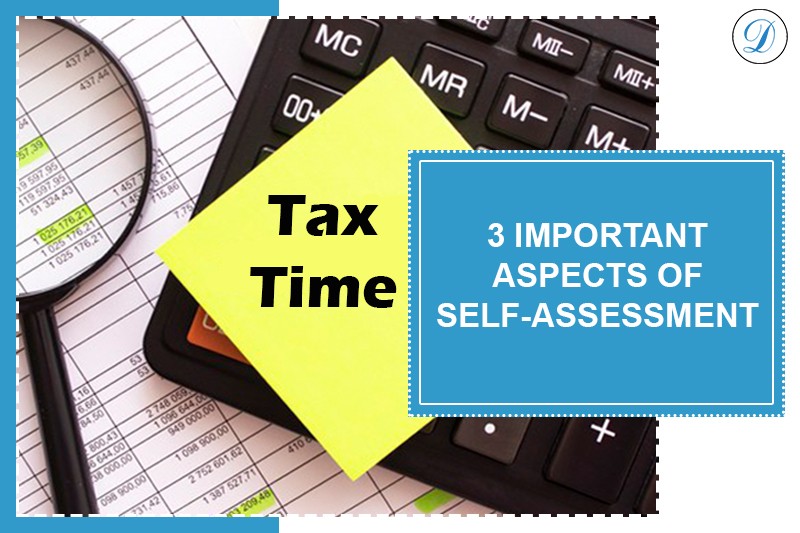Three Important Aspects of self-assessment in Taxation

October 19, 2020
As you are already aware, the self-assessment deadline is approaching, and essential steps are required for successful tax filing. In this new year, where resolutions are trending in 2024, let's make a commitment not to overlook the pending task of filing self-assessment tax returns. According to an HMRC report, more than 5.7 million sole traders have not yet completed their self-assessment tax filings. To ensure a smooth process, consider the following essential aspects for successful tax filing.
There are 3 important aspects of the Self-assessment tax return which we are describing below:
Income Tax
Income isn’t just the money you earn through a particular job, it also applies to some state benefits, the money you earn from business and certain types of interests as well. You need to note that not all types of income are taxable here. Most individuals are permitted to a personal allowance that is tax-free completely. And also note that there is no personal tax allowance on incomes over £125,000.
Capital Gains Tax (CGT)
Capital Gains Tax (CGT) is applicable to the increased value of your possessions - such as a second home, antiques or shares - during the time when you have owned them.
Any tax is due when you sell them or give them away. There are two different rates of CGT - one for the property and the other for other assets. How much you pay depends on the asset you've made a profit on and your tax band.
| Tax bracket | CGT Rates on Assets | CGT Rates on Property |
| Basic-rate Payer | 10% | 18% |
| Higher /Additional- rate payer | 20% | 20% |
The capital gains tax allowance for 2020-21 is £12,300, which was £12,000 in 2019-20. This is the amount of profit you make from an asset current tax year before any tax you pay. If your assets are owned jointly with another person, you can use both of your allowances, which can efficiently double the amount you can make before CGT is due.
If you are married or are in a civil partnership, you are free to transfer these assets to each other without any CGT being charged.
The table below will explain your CGT allowance for the tax years 2020-21 and 2019-20
| Tax Year | 2019-20 | 2020-21 |
| CGT allowance for an individual | £12,000 | £12,300 |
| Couple’s allowance (married or in civil partnership only) | £24,000 | £24,600 |
However, if you choose to transfer any of your assets to your partner, you need to keep in mind that if you later you sell the asset, you'll have to pay based on the gain made during the period it was owned by you as a couple, rather than since the asset was passed to your partner.
If you don't make full use of your CGT allowance in a given tax year, you aren't allowed to carry it forward to the next year.
However, if you want to transfer your assets to your partner, you have to keep in mind that you have to pay taxes if you sell that asset for the time it was owned by you as a couple.
If you don't make full use of your CGT allowance in a given tax year, you are not allowed to carry it forward to the next year.
Inheritance Tax
For the inheritance tax, the estate of a person who died usually pays the Inheritance Tax. You may need to pay Inheritance Tax on a gift the person gave you in the 7 years before their death. You may also need to pay it if your inheritance is put into a particular trust and the trust is unable to pay it.
If the will states that Inheritance Tax should be paid out of the assets you have inherited, then the executor of the will have to pay it. HM Revenue and Customs (HMRC) will contact you if you need to pay that tax.
Rates of Inheritance Tax
The standard Inheritance Tax rate is kept at 40%. It’s only charged on the part of your estate if it is above the given threshold. The Inheritance Tax can be paid at a reduced rate of 36% on several assets if you leave 10% or more of the ‘net value’ for charity purpose in your will.
Tax Relief and the Exemption
Some gifts which are given while the person is alive may be taxed after his death. Depending on when that gift is given, ‘taper relief’ might mean the Inheritance which is Tax charged on that particular gift is less than 40%.
Other reliefs, such as Business Relief, which allows some assets to be passed on free of Inheritance Tax or sometimes with a reduced bill.
Conclusion
As the deadline approaches, focusing on these three crucial aspects of self-assessment tax will provide business owners with a roadmap to confidently navigate the filing process. Taking early steps, maintaining meticulous records, and seeking professional assistance can lead to a smoother and more manageable tax return filing experience. For comprehensive support, consider outsourcing to a professional accounting company that can handle your self-assessment tax. Contact our expert team today for personalised assistance tailored to your business needs via call or email.
There are many reasons why implementation of your tax return early may help you and why now is a perfect time to make sure that your tax affairs. By Outsourcing tax return preparation services to Doshi, we calculate your taxable income and let you know any tax to pay or if you're entitled to a tax refund!
Doshi Outsourcing is one of the leading accounting outsourcing company. With more than 20 years of experience in accounting, bookkeeping and taxation, Doshi Outsourcing is the preferred choice of UK accounting firms for outsourcing self assessment tax return preparation work.


